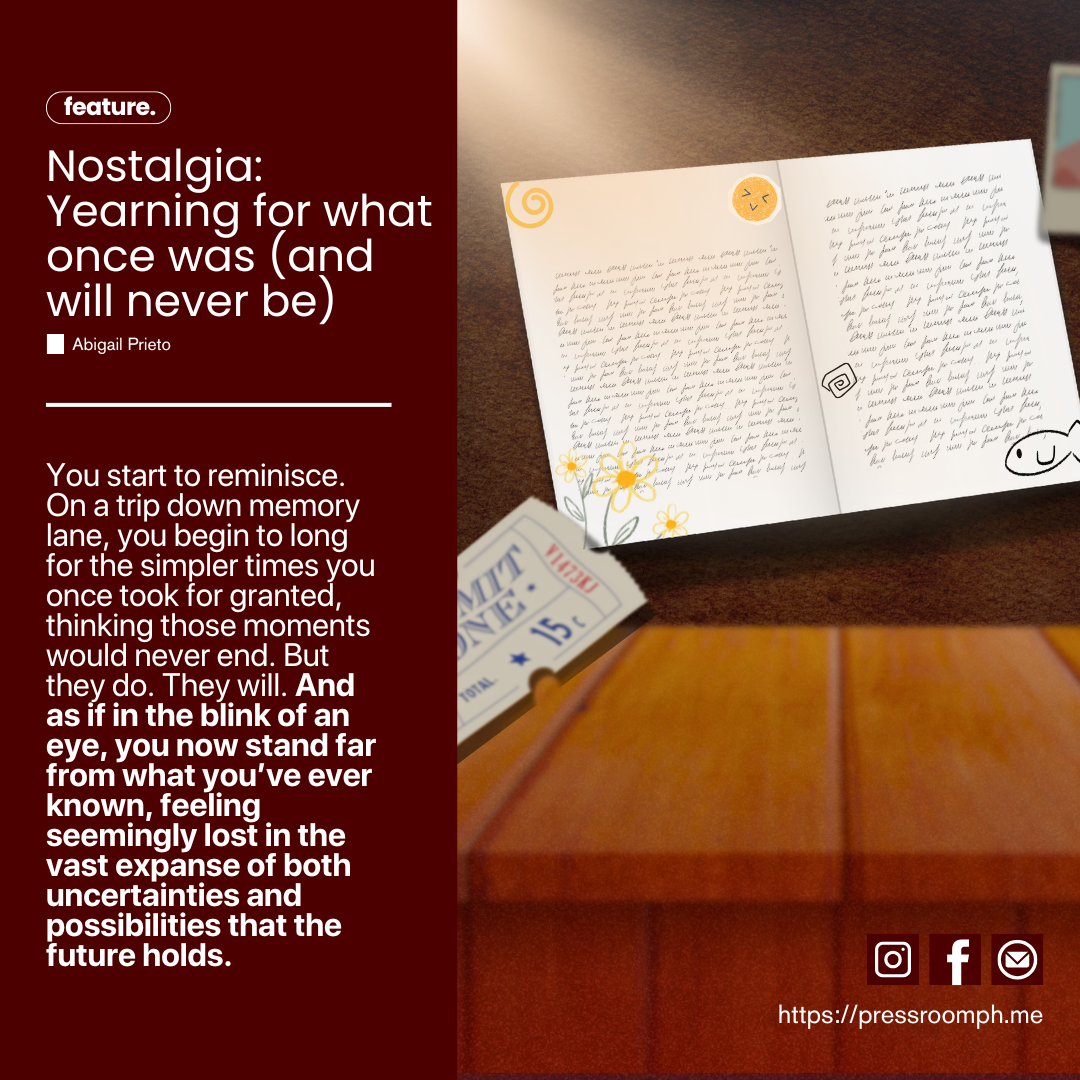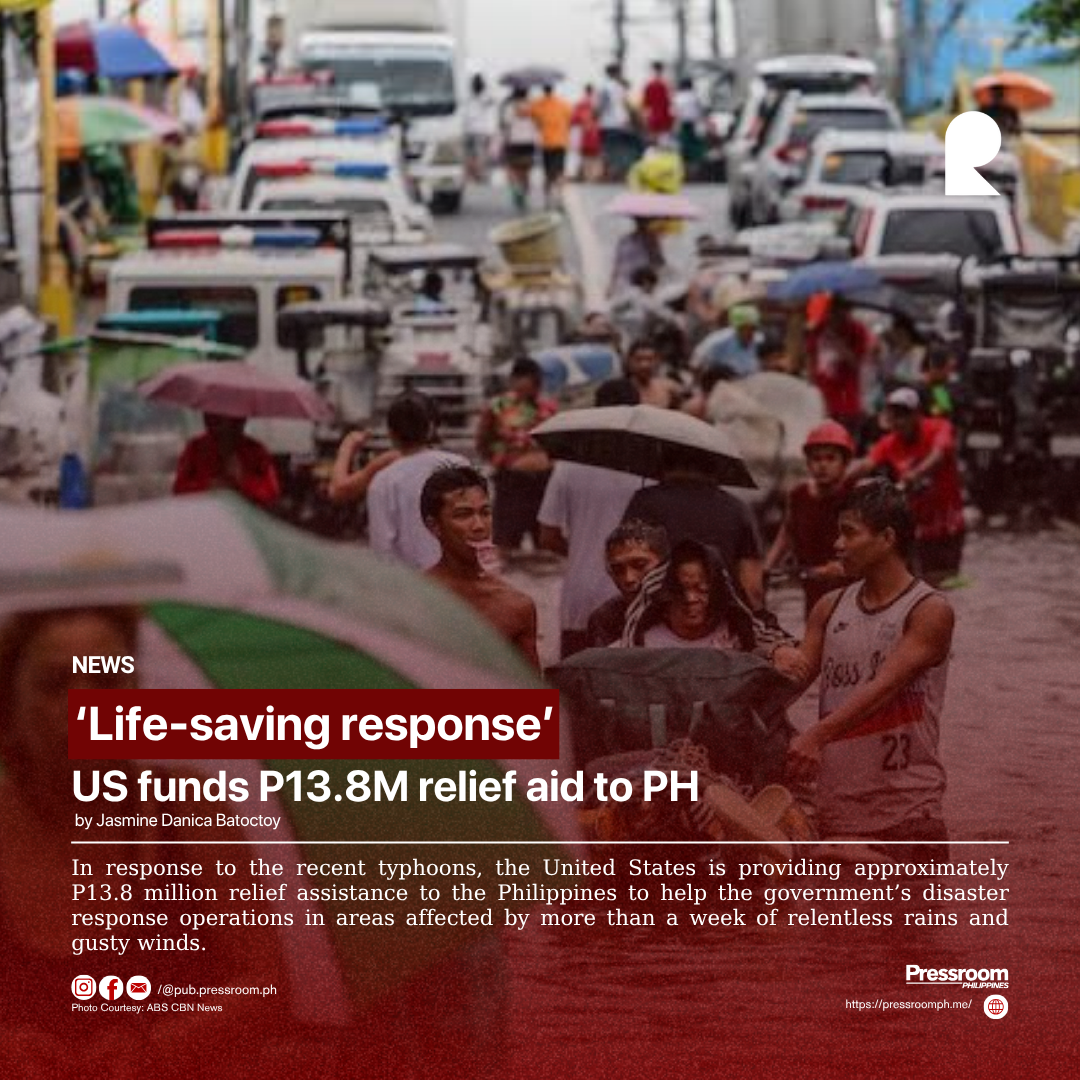via Abigail Prieto, Pressroom PH
It’s been one week since the end of your academic calendar. You start to pack your things in the dorm you’ve been renting for three years now, ready to go home and maybe rest a little if time and circumstances permit. As you rummage through all your belongings, deciding which items to bring home, you come across an old notebook you’d forgotten even existed. Inside, there are messily glued photos, old receipts, some food packaging you found cool and decided to keep, and handwritten rants, poetry, and messages about moments you wished to preserve so that one day, you could flip through memories of the past that once gave you joy, hope, anger, or grief.
You start to reminisce. On a trip down memory lane, you begin to long for the simpler times you once took for granted, thinking those moments would never end. But they do. They will. And as if in the blink of an eye, you now stand far from what you’ve ever known, feeling seemingly lost in the vast expanse of both uncertainties and possibilities that the future holds. That’s when the pressure of chasing and reaching for what lies ahead gets to you. You start to seek the comfort of familiarity and rekindle a past sense of ease and belonging—until you give in to nostalgia.
Nostalgia
Nostalgia is often defined as a feeling of deep longing for the past that allows us to reflect on, and sometimes romanticize, past moments of familiarity and contentment. It makes one ache for home and harbor a bittersweet feeling accompanied by a hint of sadness, yearning for the moments that have long passed and yet still resurface every time they can, especially on days when loneliness and boredom are intensified. It’s often triggered by happy memories born out of the relationships we had back then.
From a deadly disease to a comforting escape
But nostalgia wasn’t just a sentimental feeling back when it first emerged. It was considered a deadly disease that often affected soldiers fighting far from their homes. In the 1680s, it caused its sufferers lethargy, depression, and hallucinations. It was a serious illness with physical and psychological symptoms that led to death. Now, nostalgia is something we get to experience every time we want to feel the warmth of before, of moments that once comforted our being. It makes us cherish those who and what were around us. And in some way, it instills a sense of meaning in life.
In the present time, baggy jeans, Y2K fashion, ‘90s music and movies, old TV commercials, and shaggy haircuts are only a few things that often evoke nostalgia for many people, sometimes spanning across generations. With the world becoming more unsettling due to pandemics, wars, and climate crises, people are coping by seeking a time of comfort. Nostalgia, in its complex ways, has become a form of escapism, tending to those who seek refuge from their own feelings and present circumstances.
Triggers and illusions
On other occasions, fragments of the past can reach you in an absurd manner: a casual walk on a street you used to frequent with someone you had a close relationship with; an iced cold matcha paired with a cinnamon roll; the fresh, clean, and woody scent of perfume you smell as someone walks past; an original song written for you by a late lover playing suddenly; and even just seeing silly keychains on the street. All of these can trigger a wave of nostalgia, taking you back to a moment you once believed would stay.
However, our minds can sometimes play tricks on us. We can never truly get a hold of what has already happened. We can try to relive it in the way we remember it, but our brain tends to filter our memories. The pleasant times we once experienced can be recalled as slightly more perfect than they actually were. This idealization of past moments is a manifestation of the fact that there were no truly easier, simpler times we so often believe existed and longingly look back on.
Time waits for no one
Time is a tricky concept. Sometimes, we feel nostalgic over things that aren’t even gone yet. The present is our greatest ally, yet we often let the past have power over us. Could it be because of fear? Or pressure? Or maybe extreme happiness? Whatever it might be, one thing is for sure: time waits for no one. No matter how much we try to cling to what once was, we can never go back. Our efforts to revive the past through different trends in hopes of re-experiencing the beauty of it again will never succeed, as it can never be perfectly replicated.
Nostalgia, with its bittersweet blend of melancholy, can only be our reminder of the beauty of what once was until we can learn to accept what’s irrevocably gone: who we once were, where we have been, what we have done, and ultimately what we were able to experience along with the moments that slipped through the palm of our hands—those we regretfully never got the chance to come across.






